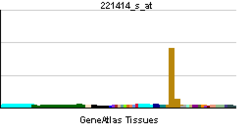- DEFB126
-
Defensin, beta 126 Identifiers Symbols DEFB126; C20orf8; DEFB-26; DEFB26; ESP13.2; bA530N10.1; hBD-26 External IDs HomoloGene: 49954 GeneCards: DEFB126 Gene Gene Ontology Molecular function • protease inhibitor activity Cellular component • extracellular region Biological process • defense response to bacterium Sources: Amigo / QuickGO RNA expression pattern 
More reference expression data Orthologs Species Human Mouse Entrez 81623 n/a Ensembl ENSG00000125788 n/a UniProt Q9BYW3 n/a RefSeq (mRNA) NM_030931 n/a RefSeq (protein) NP_112193 n/a Location (UCSC) Chr 20:
0.12 – 0.13 Mbn/a PubMed search [1] n/a Beta-defensin 126 is a protein that in humans is encoded by the DEFB126 gene.[1][2]
Function
Defensins are cysteine-rich cationic polypeptides that are important in the immunologic response to invading microorganisms. The protein encoded by this gene is secreted and is a member of the beta defensin protein family. Beta defensin genes are found in several clusters throughout the genome, with this gene mapping to a cluster at 20p13. The encoded protein is highly similar to an epididymal-specific secretory protein (ESP13.2) from cynomolgus monkey.[2]
It has been suggested that a common variation in the DEFB126 gene generates abnormal mRNA and can somewhat impair fertility.[3]
References
- ^ Schutte BC, Mitros JP, Bartlett JA, Walters JD, Jia HP, Welsh MJ, Casavant TL, McCray PB Jr (Feb 2002). "Discovery of five conserved β-defensin gene clusters using a computational search strategy". Proc Natl Acad Sci U S A 99 (4): 2129–33. doi:10.1073/pnas.042692699. PMC 122330. PMID 11854508. http://www.pubmedcentral.nih.gov/articlerender.fcgi?tool=pmcentrez&artid=122330.
- ^ a b "Entrez Gene: DEFB126 defensin, beta 126". http://www.ncbi.nlm.nih.gov/sites/entrez?Db=gene&Cmd=ShowDetailView&TermToSearch=81623.
- ^ Tollner, Theodore; Scott A. Venners, Edward J. Hollox, Ashley I. Yudin, Xue Liu, Genfu Tang, Houxun Xing, Robert J. Kays, Tsang Lau, James W. Overstreet, Xiping Xu, Charles L. Bevins, and Gary N. Cherr (July 2011). "A Common Mutation in the Defensin DEFB126 Causes Impaired Sperm Function and Subfertility". Sci Transl Med 3 (92): 92ra65. doi:10.1126/scitranslmed.3002289. PMID 21775668. Lay summary – NY Times.
Further reading
- Gerhard DS, Wagner L, Feingold EA et al. (2004). "The Status, Quality, and Expansion of the NIH Full-Length cDNA Project: The Mammalian Gene Collection (MGC)". Genome Res. 14 (10B): 2121–7. doi:10.1101/gr.2596504. PMC 528928. PMID 15489334. http://www.pubmedcentral.nih.gov/articlerender.fcgi?tool=pmcentrez&artid=528928.
- Rodríguez-Jiménez FJ, Krause A, Schulz S et al. (2003). "Distribution of new human beta-defensin genes clustered on chromosome 20 in functionally different segments of epididymis". Genomics 81 (2): 175–83. doi:10.1016/S0888-7543(02)00034-4. PMID 12620395.
- Strausberg RL, Feingold EA, Grouse LH et al. (2003). "Generation and initial analysis of more than 15,000 full-length human and mouse cDNA sequences". Proc. Natl. Acad. Sci. U.S.A. 99 (26): 16899–903. doi:10.1073/pnas.242603899. PMC 139241. PMID 12477932. http://www.pubmedcentral.nih.gov/articlerender.fcgi?tool=pmcentrez&artid=139241.
- Deloukas P, Matthews LH, Ashurst J et al. (2002). "The DNA sequence and comparative analysis of human chromosome 20". Nature 414 (6866): 865–71. doi:10.1038/414865a. PMID 11780052.
- Perry AC, Jones R, Moisyadi S et al. (1999). "The novel epididymal secretory protein ESP13.2 in Macaca fascicularis". Biol. Reprod. 61 (4): 965–72. doi:10.1095/biolreprod61.4.965. PMID 10491631.
- Suzuki Y, Yoshitomo-Nakagawa K, Maruyama K et al. (1997). "Construction and characterization of a full length-enriched and a 5'-end-enriched cDNA library". Gene 200 (1–2): 149–56. doi:10.1016/S0378-1119(97)00411-3. PMID 9373149.
- Maruyama K, Sugano S (1994). "Oligo-capping: a simple method to replace the cap structure of eukaryotic mRNAs with oligoribonucleotides". Gene 138 (1–2): 171–4. doi:10.1016/0378-1119(94)90802-8. PMID 8125298.
Categories:- Human proteins
- Chromosome 20 gene stubs
Wikimedia Foundation. 2010.
